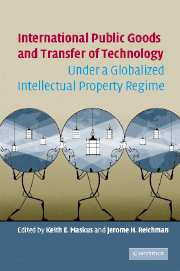Book contents
- Frontmatter
- Contents
- List of contributors
- Preface
- PART I International Provision of Public Goods under a Globalized Intellectual Property Regime
- 1 The Globalization of Private Knowledge Goods and the Privatization of Global Public Goods
- 2 The Regulation of Public Goods
- Comment: Norms, Institutions, and Cooperation
- 3 Distributive Values and Institutional Design in the Provision of Global Public Goods
- 4 Koyaanisqatsi in Cyberspace: The Economics of an “Out-of-Balance” Regime of Private Property Rights in Data and Information
- 5 Linkages Between the Market Economy and the Scientific Commons
- Comment I: Public Goods and Public Science
- 6 Sustainable Access to Copyrighted Digital Information Works in Developing Countries
- 7 Agricultural Research and Intellectual Property Rights
- Comment II: Using Intellectual Property Rights to Preserve the Global Genetic Commons: The International Treaty on Plant Genetic Resources for Food and Agriculture
- PART II Innovation and Technology Transfer in a Protectionist Environment
- PART III Sectoral Issues: Essential Medicines and Traditional Knowledge
- PART IV Reform and Regulation Issues
- Index
2 - The Regulation of Public Goods
Published online by Cambridge University Press: 05 May 2010
- Frontmatter
- Contents
- List of contributors
- Preface
- PART I International Provision of Public Goods under a Globalized Intellectual Property Regime
- 1 The Globalization of Private Knowledge Goods and the Privatization of Global Public Goods
- 2 The Regulation of Public Goods
- Comment: Norms, Institutions, and Cooperation
- 3 Distributive Values and Institutional Design in the Provision of Global Public Goods
- 4 Koyaanisqatsi in Cyberspace: The Economics of an “Out-of-Balance” Regime of Private Property Rights in Data and Information
- 5 Linkages Between the Market Economy and the Scientific Commons
- Comment I: Public Goods and Public Science
- 6 Sustainable Access to Copyrighted Digital Information Works in Developing Countries
- 7 Agricultural Research and Intellectual Property Rights
- Comment II: Using Intellectual Property Rights to Preserve the Global Genetic Commons: The International Treaty on Plant Genetic Resources for Food and Agriculture
- PART II Innovation and Technology Transfer in a Protectionist Environment
- PART III Sectoral Issues: Essential Medicines and Traditional Knowledge
- PART IV Reform and Regulation Issues
- Index
Summary
ABSTRACT
The chapter examines the complex ways in which public goods are regulated. The provision and distribution of public goods is deeply affected by the degree of excludability of those goods and the regulatory context of that excludability. Using a decentered conception of regulation, the chapter shows through various examples how state and non-state actors regulate each other's capacities to provide, access, and distribute public goods. The chapter includes a discussion of the regulation of knowledge by the rules of intellectual property.
Introduction
Public goods range from those that are constituted by norms (peace, order, and good government) to those physical goods that provide a collective benefit independently of any norms (forests and algae that consume carbon are two examples). Such goods are typically defined in terms of two qualities: non-rivalry in consumption and non-excludability. Knowledge is perhaps the quintessential public good and there has long been a fundamental debate about how best to ensure its development and distribution.
Adam Smith observed that goods of general benefit to a society would have to be funded by means of a general contribution. This potentially left a large range of goods to be provided through the public budgetary process. But after the recognition that most of the real economy operated in the messy world of impure public goods, attention began to focus on ways in which public goods could be provided through some form of exclusion, thereby allowing the market to play a much greater role in the provision of such goods.
- Type
- Chapter
- Information
- International Public Goods and Transfer of Technology Under a Globalized Intellectual Property Regime , pp. 46 - 64Publisher: Cambridge University PressPrint publication year: 2005
- 3
- Cited by

